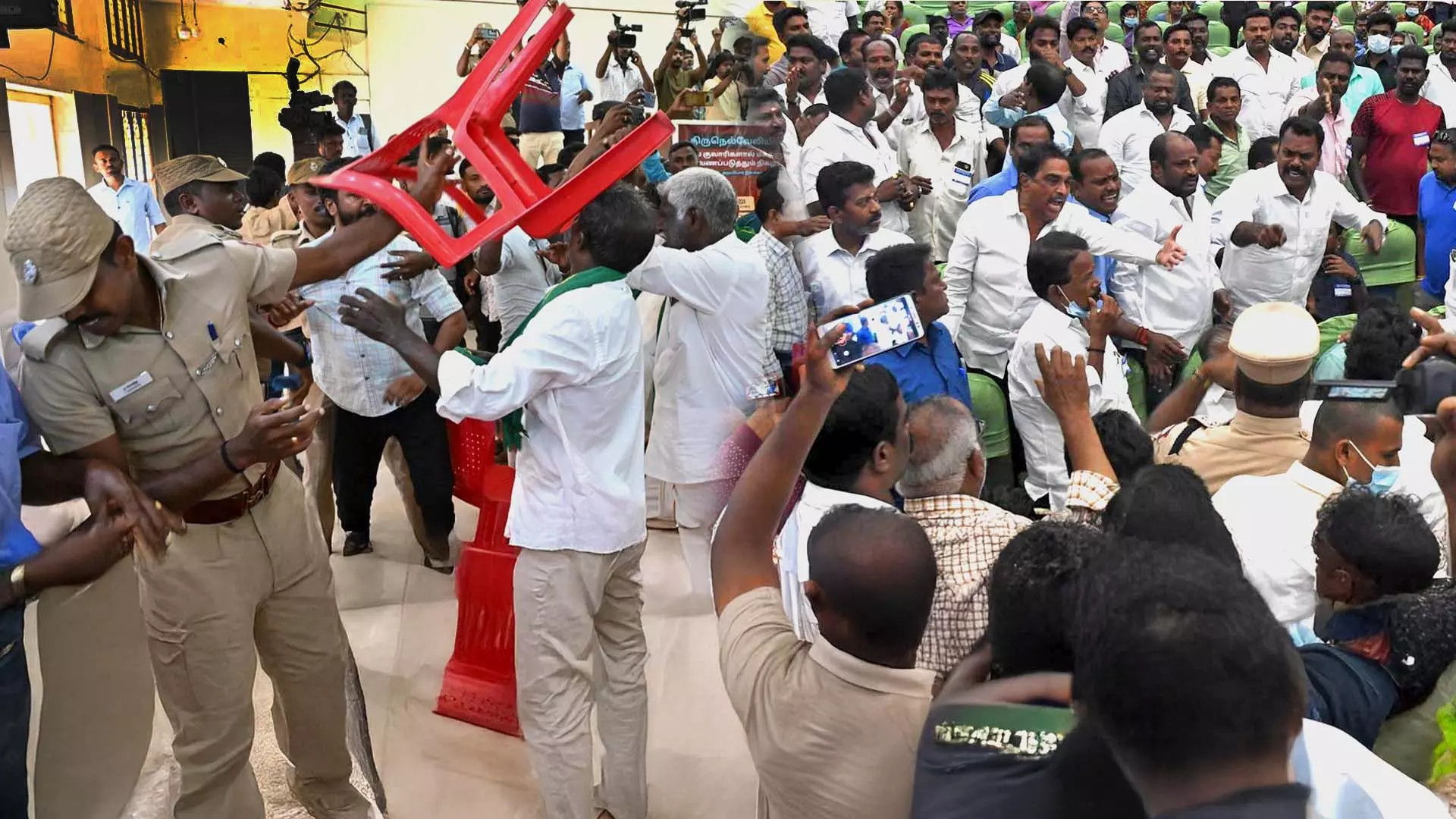
A pattern of public hearings in TN being disrupted, cancelled, or controlled
Democratic purpose of public consultations being undermined by vested interests, especially when communities raise environmental objections, say activists

A public hearing in Tirunelveli, Tamil Nadu, meant to address local concerns about illegal stone quarrying, descended into chaos on November 2. The meeting, chaired by senior advocate V Suresh, was disrupted when a group claiming to represent quarry owners stormed the venue, shouted down participants, and hurled chairs across the hall.
Suresh, who was presiding over the session, sustained a head injury after being struck during the violence. Police personnel intervened to control the situation, but by then the hearing had collapsed into disorder.
Organisers from the citizens’ group Arappor Iyakkam alleged that the attack was orchestrated to silence villagers and activists who had gathered to voice opposition to illegal quarrying operations in the district.
“A deliberate attempt to silence”
Rights activists present at the venue called the violence an attempt to intimidate citizens seeking accountability.
RTI activist Jayaraman said, “Whenever people try to expose corruption or environmental violations, the system finds a way to silence them — either by cancelling hearings or allowing violence like this.”
According to Arappor Iyakkam, such incidents show that the democratic purpose of public consultations is being undermined by vested interests, especially when communities raise environmental or livelihood-related objections.
Pattern of disruption
Activists say the Tirunelveli incident is not isolated but part of a larger pattern of public hearings being disrupted or cancelled across Tamil Nadu whenever projects face public opposition.
Recent examples include cancelled or chaotic hearings over infrastructure and industrial projects in Nilgiris, Ennore, Chennai, and other districts. In many of these cases, either the meetings were called off abruptly or were marred by unruly scenes.
Visuals from past hearings show empty halls, police presence, and villagers waiting outside locked venues — images that highlight growing frustration among communities seeking to participate in environmental decision-making.
Repeated cancellations
In March 2025, the Tamil Nadu Pollution Control Board (TNPCB) abruptly cancelled a scheduled hearing in Kundha, Nilgiris, on the controversial Silahalla Pumped Storage Project. The project, opposed by farmers and conservationists across 20 villages, was criticised for its potential impact on water sources and farmland.
Officials cited “confusion” as the reason for the cancellation, promising a rescheduled session — which has yet to take place. Activists viewed it as another example of how authorities manage dissent by simply removing public platforms for it.
A similar scene unfolded in Ennore in December 2024, when a TNPCB hearing on the expansion of a coal-fired thermal power station turned chaotic. Residents alleged that local political functionaries packed the hall with supporters while genuine critics were blocked or denied the right to speak.
Democracy disrupted
Witnesses from Ennore recalled that tensions escalated after only pro-project speakers were allowed to address the panel. The District Collector, who chaired the hearing, left midway — before many citizens opposing the expansion could voice their concerns.
Activists described this as a “stage-managed” event, designed to showcase procedural compliance while suppressing public dissent. Environmentalists warn that such practices reduce the concept of public consultation to a mere formality, stripping it of substance and accountability.
Environmentalist R Sundararajan noted, “Instead of facing people’s questions, the government often withdraws or curtails hearings. Environmental governance cannot happen behind closed doors.”
Systemic sidelining of voices
The pattern extends beyond a few projects. In 2023, hearings on the Pen Memorial at Chennai’s Marina Beach and the Coastal Zone Management Plan were either disrupted or scrapped altogether, with the National Green Tribunal (NGT) later cancelling one for being based on an incomplete draft.
Such incidents, activists argue, represent a worrying erosion of citizens’ rights to be consulted in environmental governance — a principle embedded in India’s Environmental Impact Assessment (EIA) process.
Whenever communities gather to question major development or industrial projects, those spaces are increasingly being curtailed — either through administrative manoeuvres or physical disruption.
From participation to silencing
From the stone quarries of Tirunelveli to the coal plants of Ennore, from Nilgiris’ hydro projects to the Chennai coast, a consistent pattern has emerged — whenever citizens attempt to participate, their voices are interrupted or ignored.
Activists warn that the consequences of silencing local communities go beyond environmental risk. They erode public trust in institutions and weaken democratic processes meant to ensure transparency and accountability in policymaking.
As one campaigner observed, these hearings are no longer about consultation but about control — managing dissent rather than listening to it.
Deeper crisis
Transparency groups say the repeated disruptions point to a deeper governance crisis — where democratic spaces are shrinking, and citizens’ right to question is being treated as a threat.
“When public hearings that are meant to build trust between government and people turn into spectacles of silence,” one activist said, “the very purpose of consultation is lost. Democracy doesn’t end at the ballot box — it continues in every public hearing, in every hall where people demand to be heard.”
The escalating attacks, cancellations, and restrictions have prompted calls for stricter oversight by the Tamil Nadu Pollution Control Board and legal safeguards to ensure that future public hearings remain open, safe, and truly participatory.
The content above has been transcribed from video using a fine-tuned AI model. To ensure accuracy, quality, and editorial integrity, we employ a Human-In-The-Loop (HITL) process. While AI assists in creating the initial draft, our experienced editorial team carefully reviews, edits, and refines the content before publication. At The Federal, we combine the efficiency of AI with the expertise of human editors to deliver reliable and insightful journalism.

